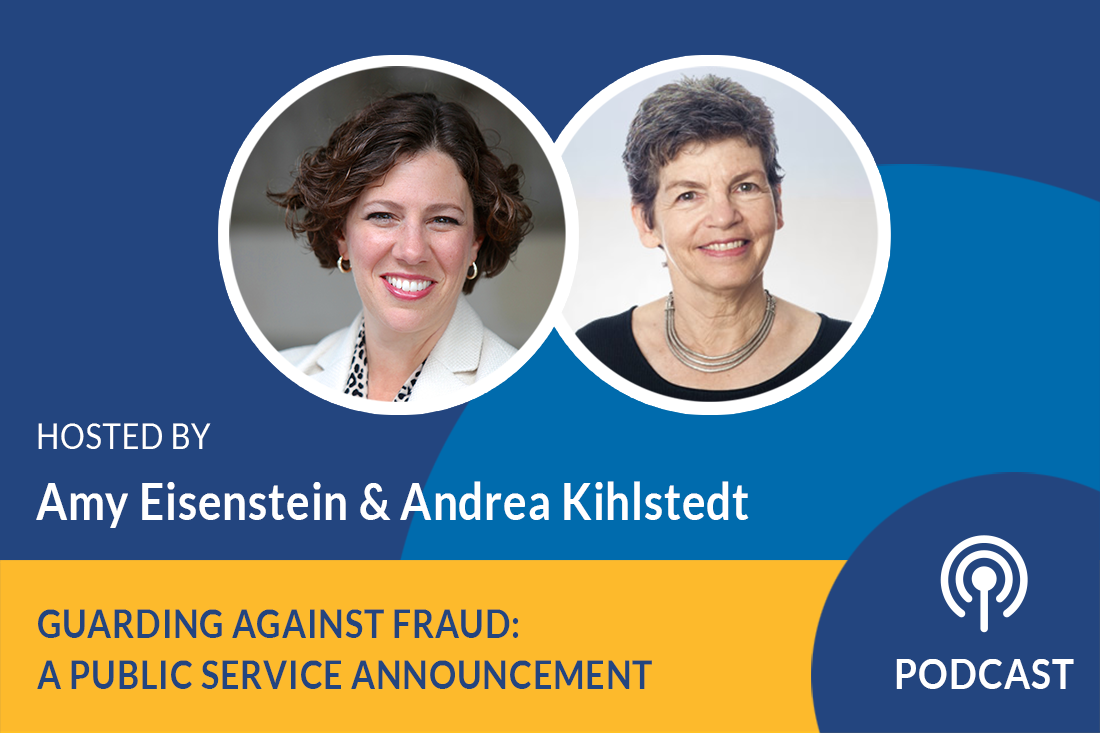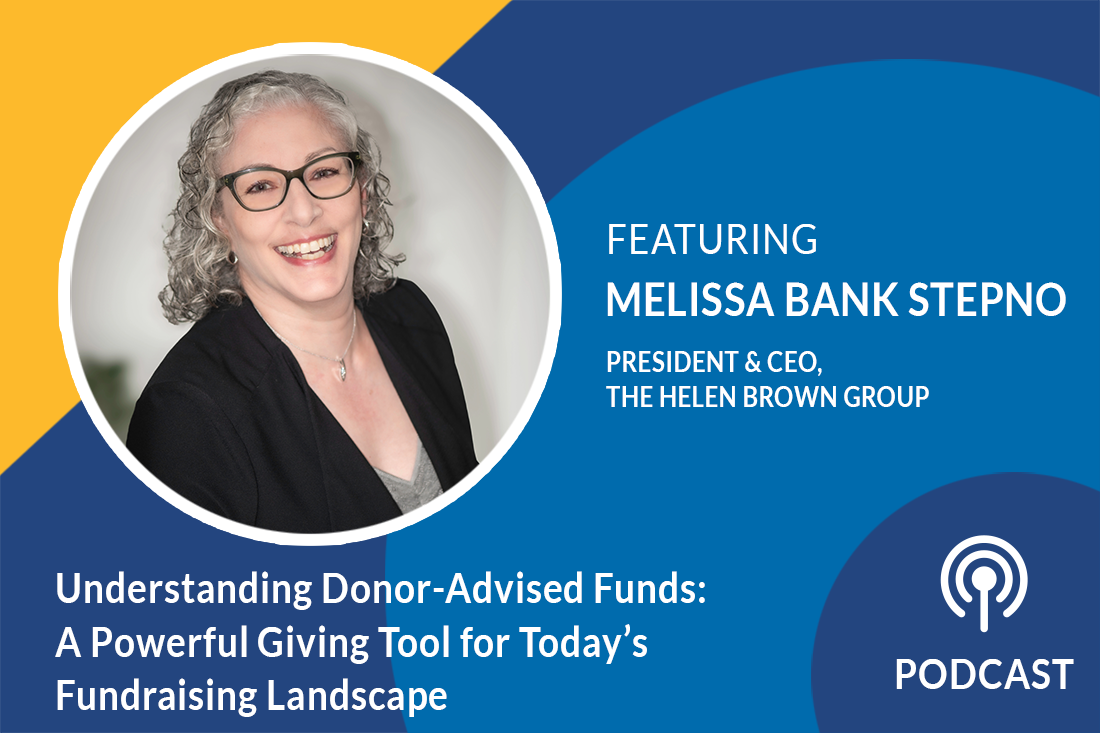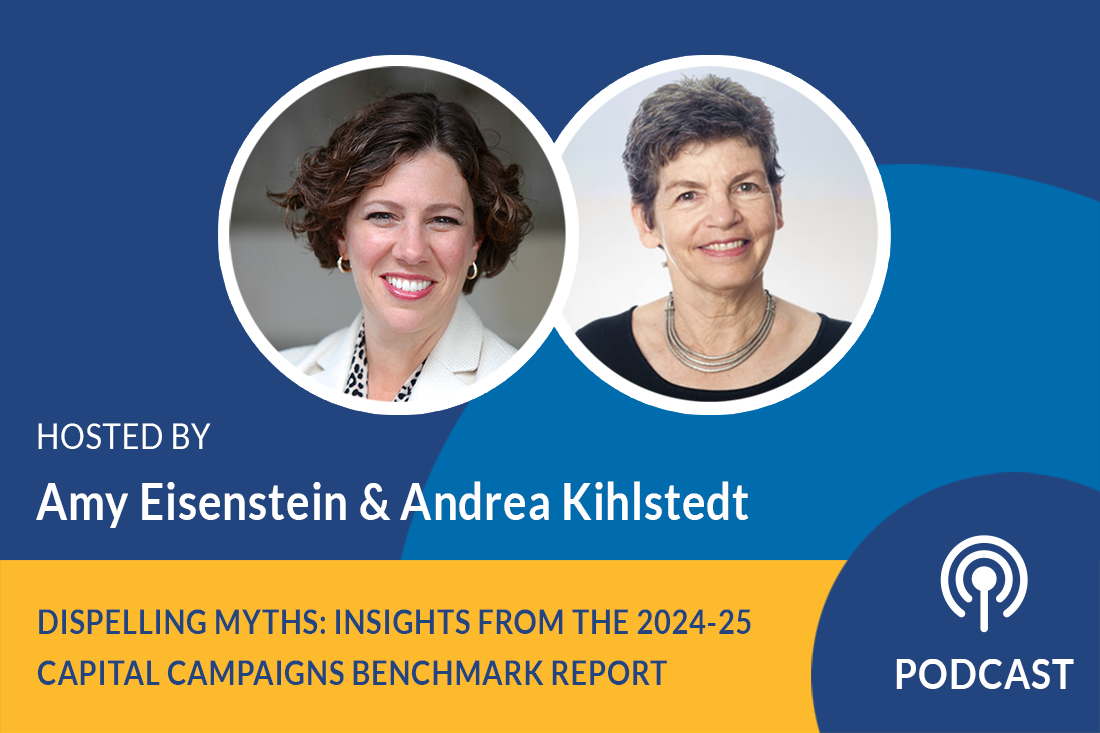Podcast: Guarding Against Fraud: A Public Service Announcement

Season 3, Episode 70
In this eye-opening episode, Amy Eisenstein and Andrea Kihlstedt address the critical issue of rampant fraud that can impact anyone, including nonprofits and individuals.
Andrea shares her personal experience of check fraud and offers practical advice on how to prevent it. From using indelible ink pens to the importance of regularly monitoring bank accounts, they cover essential tips to safeguard your finances.
Listen Now:
Amy Eisenstein:
If you are not worried about fraud, you should be.
Hi, I’m Amy Eisenstein. I’m here with my colleague, friend, co-founder Andrea Kihlstedt and today we are talking about unfortunately, rampant fraud. And Andrea, you have a story that sort of inspired this episode, so why don’t you kick us off with what just happened to you?
Andrea’s Personal Tale of Fraud
Andrea Kihlstedt:
Yes. Thanks Amy. I hate that we have to talk about fraud. I hate that this is happening, that it is rampant. And I found out today when I went to the bank about this, the bank said that it’s happening a lot. So let me tell you what happened.
In April of this year, 2024, I wrote a check as an estimated tax payment and the check that I wrote was for $508. I sent it to the state of New Jersey and it was written out to the state of New Jersey. And I sent it along with a couple of other estimated tax payments and I just wrote the checks. I put them in envelopes, I put it in the mailbox, sent it along. Never thought again about it until late last week, I got a bill from the state of New Jersey saying that I owed them $508 plus interest because I hadn’t paid my estimated tax payment.
Well, you can imagine I was surprised, right? So I went online and went into my bank account to look and see what the story was. And as I was nosing around, I saw my three estimated tax payment checks and I clicked on the checks. They give you a copy of the checks once the checks have cleared. So I clicked on one and it looked fine. I clicked on the second one, it looked fine. The one from New Jersey, on the check payable to no longer said the state of New Jersey. It had a name of someone I had never heard of before and had no idea about, and the amount was changed from $508 to $4,400.
Now the check had cleared. Now it’s a little embarrassing that I didn’t notice that. I must confess. It happened to be at a time when I had a good deal of money in my account. I was jiggling some money around and I hadn’t looked carefully. I just hadn’t looked carefully. When I looked carefully at the check and I saw someone else’s name, you could faintly see that what I had written had been erased in some way. And the person had simply written his or her information on top of it, and in the memo line had written his or her account number right over the stuff that I had written for my estimated taxes.
Amy Eisenstein:
Amazing. So blatant, these criminals are.
Andrea Kihlstedt:
So blatant. So blatant. And the reality is that had the state of New Jersey not sent me an invoice, I probably would never have thought. I mean it would’ve gone by.
Amy Eisenstein:
Now I’m guessing some listeners who watch either watch their bank accounts closely or keep a minimum balance are like:
”Oh my gosh, how could you have not noticed $3,000 that went missing?”
Andrea Kihlstedt:
I know. I know. I know.
Amy Eisenstein:
But at an organization that’s running multi-million dollar budgets, it might be easy to miss —
Andrea Kihlstedt:
It’s possible to miss it.
Amy Eisenstein:
Some kind of thing like that. And so whether it’s your personal accounts or your organization accounts. And truthfully, if they had just changed it to the same amount Andrea, you would never —
Andrea Kihlstedt:
Yes. Then I really wouldn’t.
Amy Eisenstein:
It really would’ve been a hard time to notice. They could have just put their name in and not changed the amount at all and it would’ve been $500. You would never have noticed.
Andrea Kihlstedt:
Well, I would’ve noticed because I got the bill from them saying that I hadn’t paid it.
Amy Eisenstein:
Well, that’s the only reason that you noticed.
Andrea Kihlstedt:
That’s the only reason that I would’ve noticed.
Fraud Is Happening More and More Often
Amy Eisenstein:
All right. So let’s talk about, first of all, the reason that we decided to bring up this topic is because this is the third incident in the last month that we have personally witnessed this happening. Not exactly the same thing, but fraud, right? Taking money out of somebody’s account. Once to an advisor on our team and once to a client to an organization as there was some issue with a donor that was fraudulent and somehow money got taken out of the organization’s account.
So we just thought this was super important. Go ahead. You want to say something?
Andrea Kihlstedt:
Well, I just want to tell people what happened when I went to the bank, when I went to try to track it down to see. So I called the bank fraud line. I looked online, there’s a fraud line. I talked to the person, she said, “Here’s what to do.” Gave me very specific information about what to do. And she said, “Oh yes, this is happening frequently now.” She said, “This is not uncommon.” She said go to my local bank, fill out the form there. She just told me what to do.
Now I’m going to get the money back. It’s going to take probably three months. But when I went to my local bank, they too said, “Oh, this is happening a lot.” Which really, all right, we all need to be aware. Now, what simple thing might I have done that would’ve prevented it? Had I used an indelible ink pen?
Amy Eisenstein:
Okay, so this is what the bank told you that you’re going to —
Andrea Kihlstedt:
No.
Amy Eisenstein:
Oh no?
Andrea Kihlstedt:
They didn’t tell me that.
Amy Eisenstein:
Oh, I thought the bank told you that. Okay.
Andrea Kihlstedt:
They didn’t tell me that. But I realized, and then I realized I had heard something about a problem like this where they had talked about you want to keep from being scammed, use an indelible ink pen on your checks.
Use an Indelible Ink Pen when Writing Checks
Amy Eisenstein:
So we just went on Amazon and we looked, and there are pens that are specifically labeled to prevent check washing. That’s what it’s called. They wash the ink off a regular pen off your check somehow. So these indelible ink pens are available literally for $2. So you can buy a six-pack for $12 of pens that have this check washing prevention ink in them. They’re gel pens of some sort or another. So that’s one potential easy fix. Yes.
I mean, my suggestion, of course is to start doing more and more online payments. I think it is.
Andrea Kihlstedt:
Right.
Amy Eisenstein:
While of course there are hackers trying to hack into accounts, I think that that will prevent some of this as well, of course. But paying attention to your accounts every day.
Andrea Kihlstedt:
Yeah. And don’t be like me, right? Don’t be lackadaisical. I was clearly lackadaisical, which I am as Amy knows. I am sometimes lackadaisical about things like this. I need to pay close attention. I need to check and make sure that the checks that get cleared, that everything is as it should be, and do it regularly.
Amy Eisenstein:
Right. And honestly, I mean, I have both my business and personal accounts on apps on my phone. I look every morning just as a habit and you know, it’s not going to prevent it, but I will catch it probably quickly because I do… I mean, it takes 30 seconds.
In the morning, I open the New York Times app, I look at the weather app, I check our bank accounts app. My morning routine takes… Well, if I read the whole New York Times, it takes me 30 or 40 minutes. But that’s part of my… I check the weather app, I check our bank accounts app. I check the New York Times, and sometimes I check Facebook.
Andrea Kihlstedt:
You know, Amy, I’ve often teased you because you check the bank accounts as often as you brush your teeth. And I’ve often teased you about that, but clearly your way of doing things is right. And if you have a chance to talk to people who send checks, if you have a chance to talk to or to communicate with your donors, if you could put something in a newsletter. You certainly don’t want to scare people away from giving, but you want to make them alert also that there is a lot of fraud around now.
Amy Eisenstein:
Right. So think about what Andrea’s story tells us. So she sent it through the US postal system and it was going to the state of New Jersey. So either the fraud’s in the US postal system or in the state. Now I know you may be laughing. Of course, it seems so obvious somebody that’s working for the state is doing this, but it’s not like you were sending it to some seedy… There was nothing crazy about it.
Yeah, I know. Two government institutions and the fraud is likely somewhere inside one of them. And so unfortunately, you can’t trust anything or anyone these days. So you just have to pay attention and we wanted to do a little public service announcement.
Pay Attention to Your Financial Records
I know this is super-different than our normal podcast, but because it has happened so frequently recently, we were helping a client with this issue that had funds stolen. We were not helping an advisor, but commiserating with an advisor. And then this just seemed like, okay, so check your bank accounts regularly. Pay attention to your credit cards.
I know it’s a hassle. If you’re not in the habit, it is going to take some effort, but it’s worth it. I mean, it’s such a hassle to get the money back, to undo it. If you are writing checks and you use a special pen, apparently it foils the thief. But paying attention to your bank accounts, transferring money more online than writing checks more and more whenever you can, is probably a safer bet.
Andrea Kihlstedt:
Yeah. And it’s an interesting question to think about whether people who are running nonprofits, whether development directors should talk to donors about this as an issue, right?
Amy Eisenstein:
Well, yes. And of course I wanted to say we certainly are not experts by any stretch of the imagination, but you should have these conversations at your organizations with board members. Find out what they know, talk to a local attorney, talk to your local bank. I mean, we want to start the conversation. We’re not providing advice or we’re making little suggestions.
But the truth is, this is not obviously our area of expertise. But we want you to start having this conversation and thinking about who to have the conversation with. At the board level, at your administrative level, do you want to talk about it with donors? How would you have those conversations? That kind of thing.
Andrea Kihlstedt:
Yeah. And simple things like if someone tells you that they’ve sent you a check and the check doesn’t arrive, you should let them know that the check hasn’t arrived.
Amy Eisenstein:
I think that is maybe one of the things that happened with the client. There was some circular thing. I don’t know what the exact story is, but that’s super interesting. A donor thinks they made a donation or they said they made a donation and it doesn’t show up.
Andrea Kihlstedt:
Yeah. And it’s easy to think, well, the donor just didn’t give. The reality is that they may have sent a check and it may have gotten waylaid in somebody else’s account. And anyway, it’s sad when we have to talk about things like this, when we have to deal with things like this. But I think the more we’re alert and aware of it, the more we can be talking to at least our insiders about these problems, the more we can distribute anti-check washing pens, gel pens, or whatever they are, the better. And I hope this stuff doesn’t happen to you.
Amy Eisenstein:
All right, guys, thank you so much for listening. We’ll be back on a real more fundraising related topic next week, but we just wanted to do a little public service announcement and thanks for tuning in and we’ll see you next time.



Hi Andrea and Amy
Your podcast on fraud is very welcome. I agree that at this time, there are many fraudulent opportunists and it’s pertinent to be so very cautious when both donor confidence and organisational integrity is at risk.
Even at a time where increased attention is paid to electronic funds transfer (EFT) or online credit card payments are preferred, extra caution and diligence is required. In Australia, checks are being phased out from September 2024 with only EFT, credit cards and cash being the available options for non-profits to receive traditional donations after this time.
Saying that, there are many creative fraudsters out there trying to take advantage of generous donors and susceptible non-profits so we have to be constantly vigilant.
The timing of your Public Service announcement is very timely, thank you!
Thanks for your comment, Earle. There’s nothing quite like having it happen to you to raise the issue of fraud in an urgent way! We’ve all got to be hyper-vigilant.